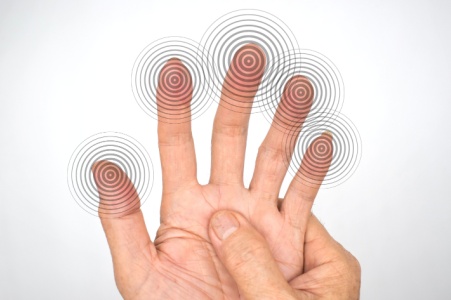
Finger numbness happens when you lose or feel less sensation in your fingers, often described as tingling, pins and needles, or a falling asleep feeling. Sometimes this goes away quickly, but if it lingers, it may point to an underlying issue. Two common reasons for finger numbness are pressure on a nerve in the wrist and a nerve in the neck being compressed. Wrist nerve pressure is often linked to repeated hand motions, while neck pressure can cause numbness to travel down the arm into the fingers. Health conditions like diabetes may also damage peripheral nerves, starting in the feet and sometimes moving into the hands. A chiropractor can evaluate whether the spine, neck, or wrist alignment is affecting nerve signals that reach your fingers. Care focused on reducing nerve pressure may restore proper sensation. If your fingers feel numb, it is suggested that you schedule an appointment with a chiropractor for an exam and appropriate treatment options.
Numbness and Tingling
Numbness and tingling sensations can disrupt daily life, often arising from issues like nerve compression, poor circulation, or structural imbalances. These symptoms, commonly felt in the hands, feet, arms, or legs, range from mild pins and needles to persistent discomfort. Conditions such as herniated discs, carpal tunnel syndrome, or peripheral neuropathy are frequent causes, often linked to irritated or restricted nerve pathways. Left untreated, these sensations may worsen, leading to reduced mobility or further nerve damage.
Chiropractic care addresses numbness and tingling by focusing on the root causes. A chiropractor evaluates spinal alignment, nerve function, and contributing factors like posture or muscle tension. Through targeted adjustments and therapies, they relieve nerve compression, improve circulation, and restore function. Lifestyle recommendations complement treatment, offering long-term relief and promoting nerve health.
1. Are numbness and tingling always nerve-related?
Not always. While often linked to nerve compression, these sensations can also result from poor circulation or systemic conditions. Chiropractors assess for nerve involvement and recommend appropriate care or referrals.
2. Can numbness and tingling affect only one side of the body?
Yes, these symptoms can be unilateral, often indicating localized nerve compression or structural imbalances, which chiropractors can identify and treat.
For additional information, please contact our office located in Omaha, NE .
